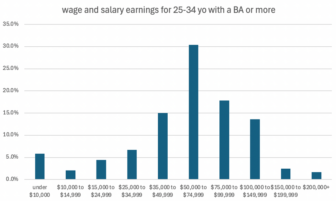Received a thoughtful response from Mike Hansen – the terrific President of the Michigan Community College Association – on my improving college graduation rates post. Mike is a reformer, one who believes his members can serve students better and is working on developing models for getting better student outcomes.
He correctly points out that the official higher education graduation rates are not very good at measuring student success. Two main reasons: There is no system for following the student. So lots of students go to a community college to earn credits for a four year degree at a university. They are counted for the community college as not getting a degree on time. And secondly because lots of students enter a community college not looking to get a degree. Many looking for skills to help find a job. So the official statistics measure them against a standard that is not connected to what they are looking for.
Clearly we need to completely revamp the standards and data collection system for higher education. The system needs to measure student outcomes – no matter how many institutions they attend – based on success in meeting student goals. That said, even with the right measurements, the system will still have success rates lower than they should be.
The main point of my post was that just like urban high schools, higher education institutions could get much better student outcomes – whether its a degree or a job – if they become obsessed with student success. That there are reforms that can and should happen at each institution in how they serve students and deliver teaching and learning that could susbstantially improve student success.
To get there we need to move to a far better system of defining and measuring student success as well as accountability standards with consequences. Just as we are increasingly intolerant of high schools where kids don’t graduate or meet basic academic standards, we need to be intolerant of higher education institutions where far too many students enter remediation classes and never develop the skills to take a college level class and where the success of students in meeting their goals – degree or otherwise – is not met in far too many cases.






